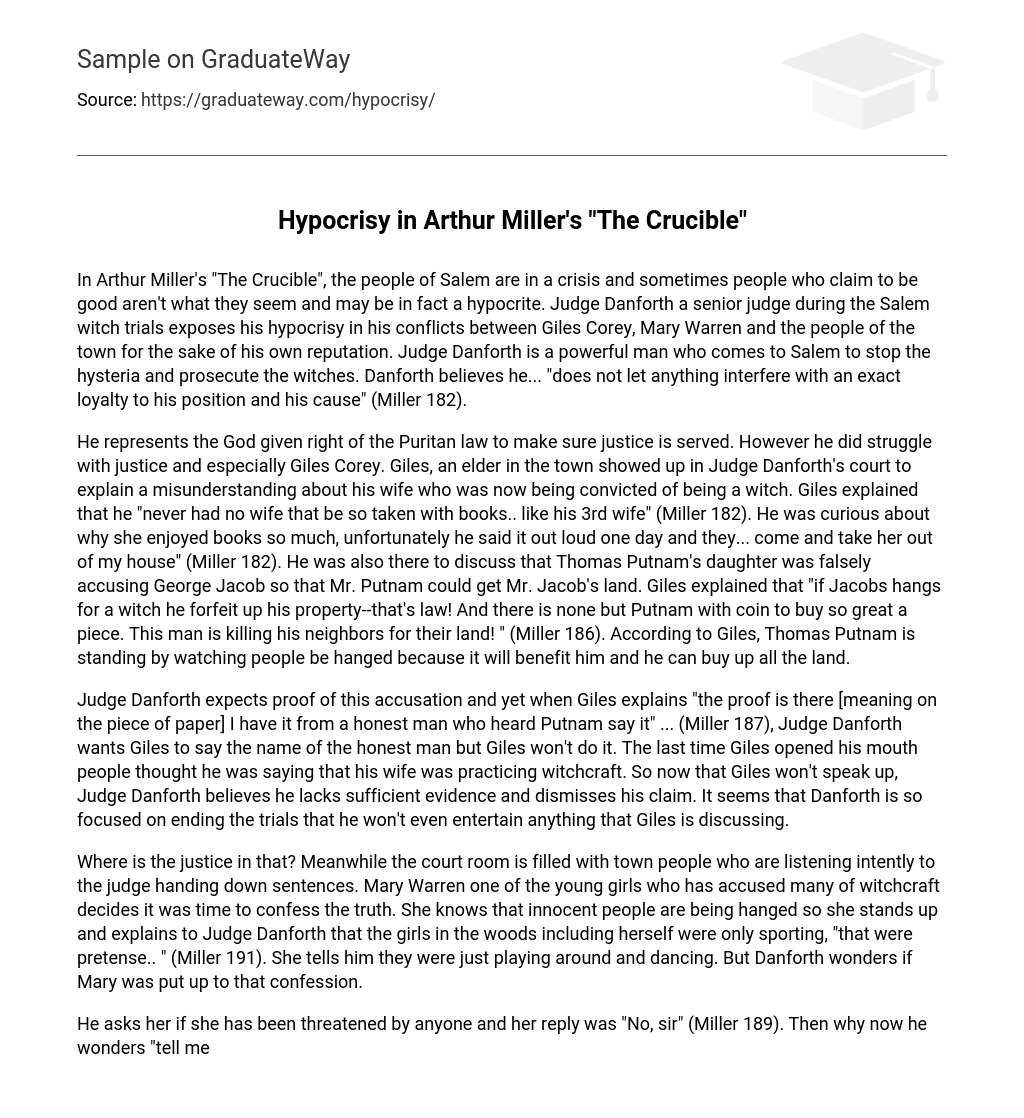In Arthur Miller’s “The Crucible”, the people of Salem are in a crisis and sometimes people who claim to be good aren’t what they seem and may be in fact a hypocrite. Judge Danforth a senior judge during the Salem witch trials exposes his hypocrisy in his conflicts between Giles Corey, Mary Warren and the people of the town for the sake of his own reputation. Judge Danforth is a powerful man who comes to Salem to stop the hysteria and prosecute the witches. Danforth believes he… “does not let anything interfere with an exact loyalty to his position and his cause” (Miller 182).
He represents the God given right of the Puritan law to make sure justice is served. However he did struggle with justice and especially Giles Corey. Giles, an elder in the town showed up in Judge Danforth’s court to explain a misunderstanding about his wife who was now being convicted of being a witch. Giles explained that he “never had no wife that be so taken with books.. like his 3rd wife” (Miller 182). He was curious about why she enjoyed books so much, unfortunately he said it out loud one day and they… come and take her out of my house” (Miller 182). He was also there to discuss that Thomas Putnam’s daughter was falsely accusing George Jacob so that Mr. Putnam could get Mr. Jacob’s land. Giles explained that “if Jacobs hangs for a witch he forfeit up his property–that’s law! And there is none but Putnam with coin to buy so great a piece. This man is killing his neighbors for their land! ” (Miller 186). According to Giles, Thomas Putnam is standing by watching people be hanged because it will benefit him and he can buy up all the land.
Judge Danforth expects proof of this accusation and yet when Giles explains “the proof is there [meaning on the piece of paper] I have it from a honest man who heard Putnam say it” … (Miller 187), Judge Danforth wants Giles to say the name of the honest man but Giles won’t do it. The last time Giles opened his mouth people thought he was saying that his wife was practicing witchcraft. So now that Giles won’t speak up, Judge Danforth believes he lacks sufficient evidence and dismisses his claim. It seems that Danforth is so focused on ending the trials that he won’t even entertain anything that Giles is discussing.
Where is the justice in that? Meanwhile the court room is filled with town people who are listening intently to the judge handing down sentences. Mary Warren one of the young girls who has accused many of witchcraft decides it was time to confess the truth. She knows that innocent people are being hanged so she stands up and explains to Judge Danforth that the girls in the woods including herself were only sporting, “that were pretense.. ” (Miller 191). She tells him they were just playing around and dancing. But Danforth wonders if Mary was put up to that confession.
He asks her if she has been threatened by anyone and her reply was “No, sir” (Miller 189). Then why now he wonders “tell me that you sat in my court, callously lying, when you knew that people would hang by your evidence? “… Danforth (Miller, 189). He wants to know how Mary could have stood there and lied about the witchcraft. “How were you instructed in your life? Do you not know that God damns all liars? ” (Miller 189). With this statement he is basically threatening Mary to rethink what she is saying and that if she changes her story now, she will be hanged.
Mary is so scared of the threat that she decides to stick with the story of witchcraft, much to Judge Danforth’s relief. More important Danforth believes he is in control of his court again having dismissed Giles and Mary Warren. He is relieved that he has not been made a fool of and the court will stand by his convictions. He may think there has been some lying but he convinces the court room that he has “seen marvels in this court. I have seen people choked before my eyes by spirits; I have seen them stuck by pins and slashed by daggers.
I have until this moment not the slightest reason to suspect that the children may be deceiving me….. ” Danforth (Miller 184). His reputation is on the line and when asked to reconsider by Reverend Parris and Judge Hawthorne who think there might be some innocent people being hanged he replies “as God have not empowered me like Joshua to stop this sun from rising, so I cannot withhold from them the perfection of their punishment” (Miller 205). Danforth is saying he would be a hypocrite if he were to “reprieve or pardon these when twelve are already hanged for the same crime.
It is not just” (Miller 204). The judge cannot say that he was wrong, there are already people who have died because he believed what the girls had told him. He really couldn’t turn back, the damage was already done and he would have lost the only thing that seemed to matter to him, which was being respected as a Judge who was just. By definition a hypocrite is “a person who puts forth on a false appearance of virtue or religion” (Merriam-Webster). Virtue means “moral excellence” (Merriam-Webster) therefore a hypocrite puts on a false moral excellence.
Judge Danforth was morally obligated to get to the truth but he became contradictory in his ways of dealing with justice and the hypocrisy was evident. He was so concerned with his authority and reputation that he ignored evidence and logic. Works Cited Merriam-Webster: an encyclopedia Britannica company <www. merriam-webster. com/dictionary/ hypocrisy>. 30 September 2010 Miller, Arthur. “The Crucible. ” Holt McDougal Literature: American Literature. Evanston, IL: Houghton Mifflin Harcourt Publishing Company. 2010. 136-212





